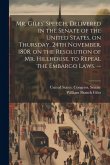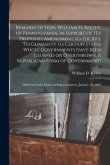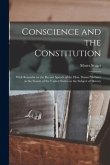This volume contains the remarks of John C. Calhoun, delivered in the Senate of the United States on April 9, 1834, concerning the bill to repeal the Force Act. Calhoun, a prominent statesman and political theorist, was a leading proponent of states' rights and a staunch defender of the institution of slavery. His speech provides valuable insight into the political and constitutional debates of the era, particularly the Nullification Crisis and the broader struggle over federal power. In his address, Calhoun meticulously dissects the implications of the Force Act, arguing against its constitutionality and warning of its potential to undermine the foundations of American liberty. His impassioned defense of states' sovereignty and his critique of centralized authority offer a compelling perspective on the complex issues that divided the nation during this pivotal period. "Remarks Of The Hon. John C. Calhoun, Delivered In The Senate Of The United States, April 9, 1834, On The Bill To Repeal The Force Act" is essential reading for anyone interested in American history, constitutional law, and the enduring legacy of John C. Calhoun. This work has been selected by scholars as being culturally important, and is part of the knowledge base of civilization as we know it. This work was reproduced from the original artifact, and remains as true to the original work as possible. Therefore, you will see the original copyright references, library stamps (as most of these works have been housed in our most important libraries around the world), and other notations in the work. This work is in the public domain in the United States of America, and possibly other nations. Within the United States, you may freely copy and distribute this work, as no entity (individual or corporate) has a copyright on the body of the work. As a reproduction of a historical artifact, this work may contain missing or blurred pages, poor pictures, errant marks, etc. Scholars believe, and we concur, that this work is important enough to be preserved, reproduced, and made generally available to the public. We appreciate your support of the preservation process, and thank you for being an important part of keeping this knowledge alive and relevant.
Bitte wählen Sie Ihr Anliegen aus.
Rechnungen
Retourenschein anfordern
Bestellstatus
Storno


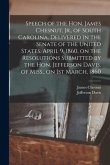
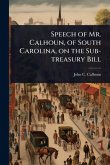
![Speech of Mr. Linn, of Missouri, in Reply to Mr. McDuffie, on the Oregon Bill [microform]: Delivered in the Senate of the United States, January 26, 1 Speech of Mr. Linn, of Missouri, in Reply to Mr. McDuffie, on the Oregon Bill [microform]: Delivered in the Senate of the United States, January 26, 1](https://bilder.buecher.de/produkte/65/65586/65586198m.jpg)
